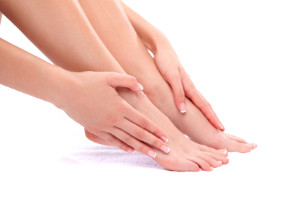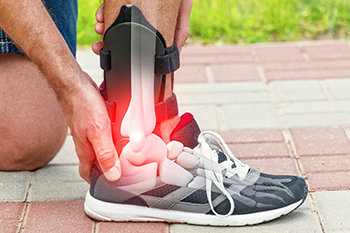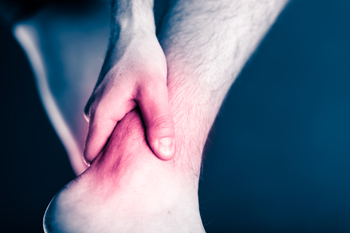Connect With Us
Blog
How to Manage Pain From a Plantar Fibroma

A bump on the bottom of the foot may be indicative of a foot condition known as plantar fibromatosis. This ailment develops on the plantar fascia which is the band of tissue that runs along the bottom of the foot. Its function is to connect the heel to the toes, in addition to supporting the arch. A plantar fibroma can form when nodules grow in the plantar fascia, and can cause pain and discomfort. Research has shown there is no cure for this condition, and existing patients often look to manage the pain. This can be done by performing specific foot stretches that can help to strengthen the foot. A calf stretch is effective in relieving pain from the plantar fascia, and this is done by standing on a step, and lowering the heel until a gentle stretch is felt. Patients may find that performing a marble pick up is helpful in strengthening the arch. This is a simple stretch, and may take some practice to perfect it. This is done by placing several marbles on the floor next to a towel, and picking one marble up at a time with your foot. If you would like more information about how to relieve pain from a plantar fibroma, please consult with a podiatrist.
A plantar fibroma may disrupt your daily activities. If you have any concerns, contact one of our podiatrists of Foot & Ankle Associates of Maine. Our doctors can provide the care you need to keep you pain-free and on your feet.
Plantar Fibroma
A plantar fibroma is a fibrous knot in the arch of the foot. It is embedded in the plantar fascia which is a band of tissue that extends from the heel to the toes along the bottom of the foot. There can be multiple plantar fibromas in the feet at the same time. There are no known causes for this condition. If you have a plantar fibroma, there will be a bump in the arch of your foot that cannot be missed. Any associated pain is most often due to a shoe rubbing against the nodule. Non-surgical options, such as steroid injections, physical therapy, and orthotics should be tried first. Surgery is a last resort and is the only thing that will remove a plantar fibroma entirely. Consult with a podiatrist for a proper diagnosis and to determine the treatment regimen that is right for you.
What Causes a Plantar Fibroma?
While there are no specific causes identified, a plantar fibroma can possibly come from genetic predisposition or the formation of scar tissue that forms from healing the tears in the plantar fascia.
What Are the Symptoms of a Plantar Fibroma?
There will be a noticeable lump in the arch of the foot that may or may not cause pain. If pain is felt, it is typically because a shoe is rubbing up against the lump or when walking or standing barefoot.
Treatment and Prevention
A plantar fibroma will not disappear without treatment, but it can get smaller and be a non-issue. If pain persists, a podiatrist examines the foot and when the arch of the foot is pressed, pain can be felt down to the toes. An MRI or biopsy might be performed to help diagnose or evaluate the plantar fibroma. The following non-surgical options are generally enough to reduce the size and pain of these nodules:
- Steroid injections
- Orthotics
- Physical therapy to help apply anti-inflammatory creams on the bump
Surgery is considered if the mass increases in size and the patient continues to feel pain after non-surgical methods are tried.
If you have any questions please feel free to contact our office located in Brunswick, ME . We offer the newest diagnostic tools and technology to treat your foot and ankle needs.
What Are Ankle-Foot-Orthoses?

Ankle-foot-orthoses (AFO) are supportive devices, or braces, that help a person with lower limb, ankle, or foot disability. AFOs function mainly to prevent deformity, increase mobility, reduce pain, and protect and support a healing injury. They can be custom made for children as well as adults to protect the foot, ankle, and leg, finishing at the knee. They can be made hinged to bend at the ankle, or solid with no ankle movement. There are several types of AFOs that are prescribed based on the precise needs of the wearer. Factors include length of time it will be worn, amount of lateral stability needed, and how the device fits into shoes. For more detailed information on ankle-foot-orthoses, please consult a podiatrist, who can help determine which AFO is best for you.
If you are having discomfort in your feet and would like to try orthotics, contact one of our podiatrists from Foot & Ankle Associates of Maine. Our doctors can provide the care you need to keep you pain-free and on your feet.
What Are Orthotics?
Orthotics are inserts you can place into your shoes to help with a variety of foot problems such as flat feet or foot pain. Orthotics provide relief and comfort for minor foot and heel pain but can’t correct serious biomechanical problems in your feet.
Over-the-Counter Inserts
Orthotics come in a wide variety of over-the-counter inserts that are used to treat foot pain, heel pain, and minor problems. For example, arch supports can be inserted into your shoes to help correct overarched or flat feet, while gel insoles are often used because they provide comfort and relief from foot and heel pain by alleviating pressure.
Prescription Orthotics
If over-the-counter inserts don’t work for you or if you have a more severe foot concern, it is possible to have your podiatrist prescribe custom orthotics. These high-quality inserts are designed to treat problems such as abnormal motion, plantar fasciitis, and severe forms of heel pain. They can even be used to help patients suffering from diabetes by treating foot ulcers and painful calluses and are usually molded to your feet individually, which allows them to provide full support and comfort.
If you are experiencing minor to severe foot or heel pain, it’s recommended to speak with your podiatrist about the possibilities of using orthotics. A podiatrist can determine which type of orthotic is right for you and allow you to take the first steps towards being pain-free.
If you have any questions please contact our office located in Brunswick, ME . We offer the newest diagnostic and treatment technologies for all your foot and ankle needs.
Heel Pain in the Morning?
A Partial or Complete Achilles Tendon Rupture

The Achilles tendon is responsible for pointing and flexing the foot, which is necessary in walking and running. It is located at the back of the heel, and connects the calf muscles to the heel. An Achilles tendon injury can occur from increasing speed and distance too quickly while running, or not properly warming up and cooling down. A tear may occur, and if the rupture is partial, the tendon remains attached to the calf muscle. A complete tear, where there is no connection between the tendon and muscle, is known as a rupture, and it is very painful and difficult to walk. This can happen as a result of high levels of stress put on the Achilles tendon from participating in activities that can include tennis, basketball, and football. There may be existing medical conditions and medications that can weaken the Achilles tendon and contribute to enduring an injury, such as Cushing’s syndrome, prednisolone, and ciprofloxacin. Common symptoms that many patients experience can be the inability to stand on their tiptoes, and there may be a flat-footed walking style. An Achilles tendon injury can be treated in different ways, and it is suggested that you urgently consult the expertise of a podiatrist who can determine what is best for you.
Achilles tendon injuries need immediate attention to avoid future complications. If you have any concerns, contact one of our podiatrists of Foot & Ankle Associates of Maine. Our doctors can provide the care you need to keep you pain-free and on your feet.
What Is the Achilles Tendon?
The Achilles tendon is a tendon that connects the lower leg muscles and calf to the heel of the foot. It is the strongest tendon in the human body and is essential for making movement possible. Because this tendon is such an integral part of the body, any injuries to it can create immense difficulties and should immediately be presented to a doctor.
What Are the Symptoms of an Achilles Tendon Injury?
There are various types of injuries that can affect the Achilles tendon. The two most common injuries are Achilles tendinitis and ruptures of the tendon.
Achilles Tendinitis Symptoms
- Inflammation
- Dull to severe pain
- Increased blood flow to the tendon
- Thickening of the tendon
Rupture Symptoms
- Extreme pain and swelling in the foot
- Total immobility
Treatment and Prevention
Achilles tendon injuries are diagnosed by a thorough physical evaluation, which can include an MRI. Treatment involves rest, physical therapy, and in some cases, surgery. However, various preventative measures can be taken to avoid these injuries, such as:
- Thorough stretching of the tendon before and after exercise
- Strengthening exercises like calf raises, squats, leg curls, leg extensions, leg raises, lunges, and leg presses
If you have any questions please feel free to contact our office located in Brunswick, ME . We offer the newest diagnostic tools and technology to treat your foot and ankle needs.

